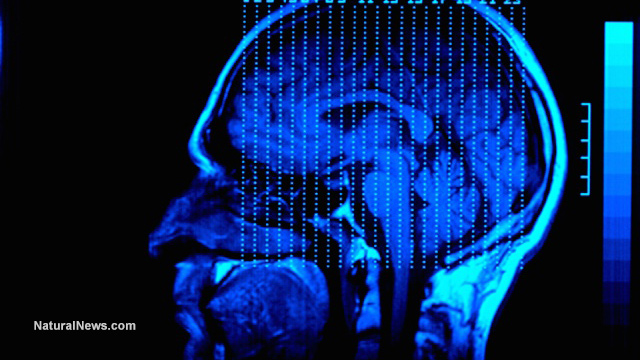Commonly used anesthetic causes Alzheimer's-related changes in brain
Monday, March 31, 2014 by: David Gutierrez, staff writer
Tags: anesthetic, Alzheimer''s, amyloid proteins

- Newly released JFK files reveal Pentagon's role in creating Lyme disease and covid in the same lab
- Ginseng's hidden anti-aging power: How compound K is rewriting the rules of skincare
- “Endgame: The Hidden Agenda 21” unveils a world of conspiracy and control
- L.A.'s rebuilding nightmare: Only 4 permits issued after fire destroys 6,000 homes
- Scientists demand FDA withdraw mRNA COVID vaccines amid contamination and gene therapy concerns
- Dr. Suzanne Humphries makes bombshell appearance on Joe Rogan podcast, exposing vaccine industry deception back to POLIOMYELITIS
- Former Congresswoman exposes CCP's deep infiltration of California through universities, ports, and fentanyl
- “The shame of Minnesota”: Somali immigrants behind $250 million child nutrition fraud in largest COVID-era scam
- PROCESSED TABLE SALT in foods found to fuel depression
- “Independent” anti-Russia outlet MEDUZA faces COLLAPSE as US funding dries up
- Here are TEN all-natural ways to protect your garden without using harmful chemicals
- BPA: The hidden hormone disruptor sabotaging your health - and how to fight back
- Chewing gum's dirty secret: How your daily habit could be flooding your body with microplastics
- The hidden battle in your glass: How A1 and A2 milk could shape your health
- Discovery of vast underground city beneath Giza pyramids challenges human history
- Catastrophic 7.7 earthquake devastates Myanmar and Thailand; death toll could reach 100,000
- CDC finally halts $11 billion COVID funding scam as health officials admit the ‘pandemic’ was a fraud
- Black cumin seed oil emerges as a powerful ally against breast cancer and chronic inflammation
- Newly released JFK files reveal Pentagon's role in creating Lyme disease and covid in the same lab
- Analysis: The coming economic collapse, a mass uprising and Trump's three secret weapons to halt the growing revolt
- Festive flavors: The sweet history, nutritional profile and health benefits of pecan pie
- Elon Musk: Aliens could be here on Earth RIGHT NOW
- Trump reverses course on Gaza plan, says “nobody is expelling Palestinians”
- Big Pharma's $8 Billion bribery scheme exposed: how doctors are pushed to prescribe junk science, not heal
- Boys are back in town: Trump’s patriotic alpha crew takes the wheel while toxic females ride in the backseat
- Reclaim your health: How midlife exercise reverses years of inactivity
- A lack of integrity in Academia: Harvard professor found GUILTY of fraudulent research to promote CRT theory
- Survival 101: Effective EMF blocking techniques
- EPA advisor admits the agency is funneling billions to climate groups ahead of Trump’s return to White House
- Dr. Mike Yeadon releases 15-minute testimony - WATCH - about genocidal intent of COVID “vaccines”
- 5 Simple steps to boost your brainpower: How to strengthen executive function in a distracted world
- Florida takes a stand: DeSantis proposes permanent ban on mRNA vaccine mandates
- Sugarcane extract superior to cholesterol-lowering drugs?
- Mike Adams Sermon 66: God will DESTROY ISRAEL for its wickedness
- Pilots report mysterious lights 'moving at extreme speeds' across Oregon skies
- Space war brewing? Russia threatens to destroy Starlink satellites
- EPA advisor admits the agency is funneling billions to climate groups ahead of Trump’s return to White House
- California's social media censorship law struck down: A victory for free speech or a threat to online safety?
- The Health Ranger releases “Vaccine Zombie” song and music video, using AI-animated zombies for the music video
- Dr. Mike Yeadon releases 15-minute testimony - WATCH - about genocidal intent of COVID “vaccines”
- The pandemic as a tool for INDOCTRINATION: Understanding “The Indoctrinated Brain” by Dr. Michael Nehls
- Newly released JFK files reveal Pentagon's role in creating Lyme disease and covid in the same lab
- Florida takes a stand: DeSantis proposes permanent ban on mRNA vaccine mandates
- Mike Adams releases country western hit single: Goin’ Back in Time is Comin’ Home
- Mike Adams releases music poetry sensation: A Child of God
- “Why we influenced the 2020 elections”: Facebook files reveal the coordinated effort to bury the Hunter Biden laptop story
- Unpacking the Lies That We’ve Been Fed – new song and music video released by Mike Adams, the Health Ranger
- RFK Jr. clears key hurdle: Sen. Susan Collins backs controversial HHS nominee, signaling a new era for health policy
- Mike Adams releases new song and music video: Nothing More Disgusting Than a Globalist
- Michigan sheriff announces criminal investigation into 2020 election crimes, Dominion Voting Systems
- Israeli soldiers accused of even more torture and abuse in the West Bank
- Migrants are taking advantage of recent hurricanes to scam residents and loot their homes
- House Intelligence Committee calls for the ARREST and PROSECUTION of Dr. Anthony Fauci
- Rep. Nancy Mace introduces bill to ban biological males from female facilities on federal property
- Red Cross issues warning to stop blood plasma donations from vaccinated people
- Scientists confirm: GENIUS brain function can be spontaneously unleashed in humans without any apparent cause
- EPA advisor admits the agency is funneling billions to climate groups ahead of Trump’s return to White House
- HYSSOP: What research reveals about the health benefits of this ancient holy herb
- Two containers with completed ballots fall out of truck in Florida
- Fully vaccinated about to see “tsunami” of illness and death, warns virologist
- Global leaders unite to clamp down on “misinformation” with UN-backed Cascais Declaration
- BREAKING: 2025 NDAA authorizes mandatory military draft of WOMEN across America… as Pentagon pursues global NUCLEAR war with both Russia and China at the same time
- Michael Yon warns of a ZIONIST TAKEOVER in Trump’s second administration
- BOMBSHELL: DNA testing kits are a SCAM to develop ethnic-specific bioweapons
- Ozempic and Wegovy weight loss drugs are injectable LIZARD VENOM PEPTIDES that may unleash a devastating wave of organ failure… side effects align with symptoms of SNAKE BITES
- Israeli soldiers accused of even more torture and abuse in the West Bank
- These 13 countries just signed an agreement to engineer a global FAMINE by destroying food supply
- NASA admits that climate change occurs because of changes in Earth’s solar orbit, and NOT because of SUVs and fossil fuels
- RFK Jr. clears key hurdle: Sen. Susan Collins backs controversial HHS nominee, signaling a new era for health policy
- Sermon 30: How Jesus reveals Caesar’s FAKE CURRENCY and FALSE AUTHORITY
- Coriander seeds: Ancient medicine backed by modern science
- Arizona officials claim Maricopa County needs 10-13 days to tabulate results of the election
Researchers have known for many years that certain patients experience dementia-like symptoms following surgery. In 2007, a team of researchers from Massachusetts General Hospital provided some of the first evidence directly linking anesthetics to these symptoms. When the researchers applied the common anesthetic gas isoflurane to nerve cells in the laboratory, levels of the enzymes beta-secretase (BACE) and gamma-secretase both increased, as did levels of the protein caspase.
BACE and gamma-secretase, in turn, are known to damage healthy amyloid precursor proteins (APPs) in the brain, breaking them into the abnormal alpha-beta proteins that accumulate during Alzheimer's disease. In the absence of BACE and gamma-secretase, an enzyme called alpha-secretase instead transforms APPs into a different, non-toxic protein.
These findings imply that the anesthetic isoflurane starts a chemical cascade that may lead to the accumulation of alpha-beta proteins and the development of Alzheimer's. The elevated levels of caspase further indicate increased cell death.
Effects confirmed in living model
In order to determine whether the same effect occurs in living mammals, the same research team exposed mice to isoflurane gas, in a study published in the Annals of Neurology in 2008. The mice were given a dose similar to what humans would receive prior to surgery, and their brains were examined at 2, 6, 12 and 24 hours after exposure.At 6 hours, levels of caspase were elevated and BACE levels had slightly increased. By 12 hours, caspase levels remained elevated and BACE levels had increased further. At 24 hours, caspase levels had returned to normal, but levels of BACE were four times higher than normal, and amyloid-beta levels had also risen. None of these changes were observed in a control group.
"These are the first in vivo results indicating that isoflurane can set off a time-dependent cascade inducing apoptosis [cell death] and enhanced levels of the Alzheimer's-associated proteins BACE and A-beta," lead author Zhongcong Xie, MD, PhD, said.
"[I]t's looking like isoflurane may not be the best anesthesia to use for patients who already have higher A-beta levels, such as the elderly and Alzheimer's patients."
Evidence in human tests
Studies in humans also suggest a link between anesthesia and Alzheimer's development. One study found that, among people aged 80 years and older, Alzheimer's risk was directly correlated with exposure to general anesthesia. Another found a direct relationship between a greater exposure to general and spinal anesthesia before the age of 50 and a younger age of Alzheimer's onset.A study conducted by researchers from the University of Pennsylvania and published in the journal Anesthesiology in 2011 further strengthened the case. Researchers collected samples of cerebral spinal fluid from 11 people about to undergo a routine endoscopic nasal surgery, then collected a further four samples at regular intervals after the surgery. They found that, six hours after surgery, levels of the Alzheimer's biomarker "tau protein" were significantly elevated in cerebral spinal fluid. Other biomarkers of inflammation and injury also increased.
High tau protein levels are considered a warning sign of Alzheimer's disease.
Participants exposed to the common inhaled anesthetic sevoflurane experienced the greatest increase in inflammatory biomarkers, compared with patients given other anesthetics.
"We have long sought a clearer picture of the true impact of anesthesia and surgery on the central nervous system," study author Dr. Roderic Eckenhoff said.
"Although not definitive, this human biomarker study gives some credibility to the notion that anesthesia and surgery produce an inflammatory insult on the brain and accelerate chronic neurodegenerative diseases like Alzheimer's."
Sources for this article include:
http://www.massgeneral.org
https://www.ncbi.nlm.nih.gov
http://www.medicinenet.com
http://science.naturalnews.com
Anesthetic at FETCH.news
Get independent news alerts on natural cures, food lab tests, cannabis medicine, science, robotics, drones, privacy and more.
Take Action: Support Natural News by linking to this article from your website
Permalink to this article:
Embed article link: (copy HTML code below):
Reprinting this article:
Non-commercial use OK, cite NaturalNews.com with clickable link.
Follow Natural News on Facebook, Twitter, Google Plus, and Pinterest
Science News & Studies
Medicine News and Information
Food News & Studies
Health News & Studies
Herbs News & Information
Pollution News & Studies
Cancer News & Studies
Climate News & Studies
Survival News & Information
Gear News & Information
News covering technology, stocks, hackers, and more



"Big Tech and mainstream media are constantly trying to silence the independent voices that dare to bring you the truth about toxic food ingredients, dangerous medications and the failed, fraudulent science of the profit-driven medical establishment.
Email is one of the best ways to make sure you stay informed, without the censorship of the tech giants (Google, Apple, Facebook, Twitter, YouTube, etc.). Stay informed and you'll even likely learn information that may help save your own life."
–The Health Ranger, Mike Adams













































